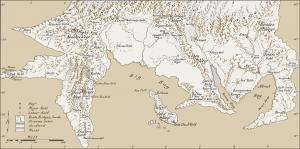I’m sure I’ve said it before on here (and if I haven’t, I should have), I didn’t grow up reading much in the way of Science Fiction or Fantasy. Which means I get to go back and read the classics that fans of the genres already appreciate. Most recently, this has meant re-reading Anne McCaffrey’s Dragonflight (in preparation for a first read of the sequel).
If you’re not familiar with it, I’m happy to recommend the book. It is set on the distant planet Pern, which was long-since colonized by humans but has lost contact with the homeworld and collapsed into a sort-of progressive feudalism. Every couple of hundred years, the Threads fall from the nearby Red planet and threaten to destroy all life on the planet. In response to this Thread threat, the past colonists bred dragons, who can teleport from one place on the planet to another instantly with the assistance and guidance of their bonded human riders. These dragons show up when the Threads fall and destroy them with fire.
But, something has gone wrong. The Threads haven’t fallen for nearly four centuries, and the number of dragons has withered down to a few dozen, while the people of Pern have lost their respect for the dragonriders and may refuse to support them up until Threads are actually falling from the sky. And even if the Threads do actually fall, there are not enough dragons to deal effectively with them. What’s more, many of the techniques and tools used in the past to fight Threads have been lost in the past. Will F’Lar and Lessa manage to discover the old secrets of fighting the Threads in time to save the planet?

As an attempt to blend science fiction and fantasy, Dragonflight is something of a flop. Which is fine, because that’s not the point anyway. The space travel and planet stuff are just a vehicle to get to what McCaffrey really wants to talk about: dragons. She does this very well, and again I think this is a book you should go read.
What I want to talk about, however, is the past. This will come up again in a review of the sequel in a very different way (at least, it will if the last 200 pages of Dragonquest match the first two hundred in theme and tone), but this beginning use of the past is important to have down. Namely, in Dragonflight the past is the source of salvation for the present. [spoilers from here on out]
Lessa saves the day when instead of taking her dragon to a different place on Pern, she takes it to a different time on Pern. Specifically she goes backwards four centuries to just after the last time that the Threads fell, gathers the dragonriders and their equipment, and brings them back to her own time. Together, the riders of the present and the riders of the past fight off the first wave of Thread attacks.
What we have here is a pretty straight-forward representation of the idea that the salvation of the present is found by looking to the past. “Conservatism,” if you will, in its purest form. But not just conservatism, there is something in Christianity about the past that is important as well. After all, our salvation was accomplished in the past. The great event wherein man was reconciled to God through the substitionary atonement of Christ on the cross is something that happened at a real place in real time–and that time was two millennia ago.
This is not to say that Christianity is entirely or inherently conservative. It’s true, we do look to the past. But we also live in the present and look to the future. Our salvation happened in the past, but we live by God’s Word and under His Spirit in the present, with our eyes on the world to come. If we stuck only with the past, we would very quickly run into problems–which I will be able to speak more about once I’ve finished the sequel to Dragonflight.
Until then, if you’ve not read it, find this book and give it a go!
Dr. Coyle Neal is co-host of the City of Man Podcast and an Associate Professor of Political Science at Southwest Baptist University in Bolivar, MO












